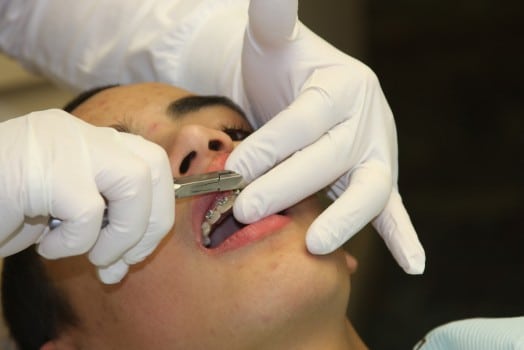Likely, from the moment you had your braces put on, you have dreamed of the day you would have your braces removed. Finally, you have an appointment scheduled to remove your braces. You remember how your brackets went on, but you might be wondering how they will come off—and whether it will hurt.
And They’re Off
The process is not long, or involved. The orthodontist will remove your brackets by squeezing each at its base, which releases the bond and pops it loose. You might feel pressure or mild discomfort, but shouldn’t experience much pain and it’s over before you know it. The adhesive used to hold the braces to your teeth is purposely left on the teeth so that no possibility of damage to the tooth occurs during removal.
Cleaning Up
After the brackets are off, the orthodontist will use a dental hand piece to remove the adhesive that was holding the bracket to the tooth. This is the same instrument that dentists use to remove cavities, but in this case it is applied only to the surface of your tooth and won’t be painful—and your enamel remains untouched.
Some patients experience minor swelling of their gum tissue after braces removal. This usually disappears in less than a week, but it is important to brush thoroughly and floss carefully. It also might take a few days for you to get used to the smooth feeling of your teeth without braces.
Retaining the Shape
Your teeth are used to being in motion, so after you have the braces removed they will be relatively unstable. Specifically, left alone the ligament fibers connecting your teeth to the jaw tend to glide back to their original positions, reversing everything you worked over the last couple years to achieve. Therefore, it is important to begin wearing a retainer a week or two after the braces are off.
The retainer is a removable appliance – usually clear plastic or a metal wire – that is custom-fit to slide over your teeth. Directions for wearing your retainer will vary, but generally you will wear it most of the time for several months and subsequently at night. You might feel a little pressure or discomfort (it is different from patient to patient) until you get used to the new appliance, but like your braces it will eventually subside.
General Upkeep
Though your orthodontic care might be coming to a close, your dental care should be ongoing. After braces it is important to visit the dentist for a thorough cleaning, and follow up regularly.
Our friendly staff at Orthodonic Associates strives to ensure you receive state-of-the-art care at every stage of your experience with braces. Contact us at any of our nine convenient locations around Baltimore, and see how we can help you achieve a winning smile.



